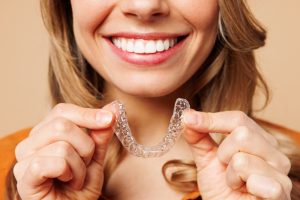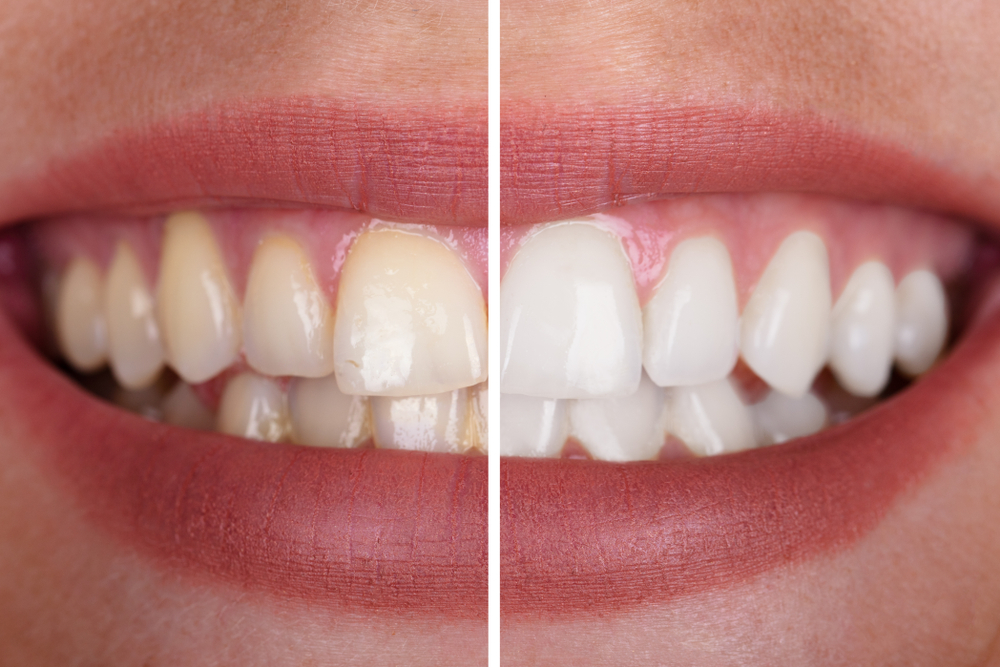Looking for dentures but don’t want the hassle of the extra work they require or the discomfort? Implant-supported dentures may be the answer if you want a more secure, comfortable smile.
Our guide will cover the procedure, costs, and benefits of implant-supported dentures. If you’re interested in talking to us about this innovation, contact us or call (417) 887-1220 for more information!
What are implant-supported dentures?
Also known as implant-retained dentures, implant-supported dentures replace several teeth at once by fusing dental implants (also called posts) composed of titanium to the key spots in the jaw bone and then attaching a set of dentures to those implants.
Unlike traditional dentures, which rely on suction and adhesive to stay in place, implant-supported dentures have a more stable structure thanks to the titanium posts.
The posts allow the dentures to function more like natural teeth. Patients can easily take the dentures off and put them back on the implants when they need to clean them. While in use, they are firmly secured in place.
How do implant-supported dentures work?
The dental implants are surgically placed in the jawbone and given a few months to heal so the titanium is fused to the bone properly. The metal implants eliminate the need for adhesives or messy pastes, giving you greater confidence and comfort.
The dental implants serve as a base for the dentures, holding them securely in place. These can be fixed or removable, depending on the patient’s needs. As with traditional dentures, your dentist may adjust the implant-supported dentures over time. The overall goal is to give you better comfort and less worry about your dentures.
What are the benefits of implant-supported dentures?
Implant-supported dentures provide a number of benefits over traditional dentures.
1) Improved Comfort
Because they are anchored firmly in place, implant-supported dentures do not slip or move around in the mouth. They’re more comfortable to wear and produce less discomfort over time.
2) Better Functionality
Unlike traditional dentures, implant-supported dentures are more stable and allow you to speak and eat normally without any discomfort or fear of the dentures slipping out of place.
3) Improved Appearance
Implant-supported dentures are custom-made to fit each patient’s mouth perfectly, resulting in a natural-looking and aesthetically pleasing appearance.
4) Durability
Implant-supported dentures are much more durable than traditional dentures, which often need to be replaced or repaired due to wear and tear. With proper care and maintenance, implant-supported dentures can last for up to 20 years compared to just 10 years for traditional dentures.
5) Bone Preservation
Implant-supported dentures help preserve the natural bone in the jaw, preventing the bone loss that often occurs with traditional dentures. This can help maintain the facial structure and prevent premature aging.
Overall, implant-supported dentures provide a more permanent and effective solution for individuals who require dentures.
Are you a good candidate for implant-supported dentures?
Implant-supported dentures are a good choice if you’ve lost some or all of your teeth due to injury, disease, or other causes. Our doctors may recommend them for patients who have a high enough bone density in their jaw to support the titanium implants. You should also be in good overall health. It’s also vital to have good oral hygiene ahead of getting these appliances.
Not everyone we see is a good candidate for these innovative dentures. Individuals who have been using traditional dentures for many years may experience bone loss in their jaw over time, which can make them less suitable candidates for implant-supported dentures.
Your dentist will evaluate your overall health, oral health, and medical history to determine whether you are a suitable candidate for this type of dental restoration. Your doctor will discuss your medical history and any concerns you may have to recommend the best course of treatment based on your unique situation.
What are the risks and side effects of implant-supported dentures?
Like any medical procedure, implant-supported dentures carry certain risks and potential side effects. It’s important to discuss these with your dentist before making a decision about this option.
One of the primary risks of implant-supported dentures is infection. As with any surgery, there is a risk of developing an infection at the site of the implant. However, following proper aftercare procedures, resting after the oral surgery, taking the prescribed antibiotics, and staying in communication with your dentist, you can greatly reduce the risk of infection.
Other potential risks of implant-supported dentures include the following rare occurrences:
- Nerve damage
- Bone loss
- Implant failure
As for side effects, some patients may experience discomfort, swelling, or bruising in the days following the surgery to place the implants. This is normal and can typically be managed with over-the-counter pain relievers.
Overall, implant-supported dentures are a safe and effective treatment option for many patients.
How much do implant-supported dentures cost?
One of the most common questions about implant-supported dentures is how much they cost. The costs vary based on a few different factors, including the number of implants needed and the materials used. The number of implants may range from four to six per jaw. The lower jawbone is denser, so you may only need two implants there. Your doctor will determine the best arrangement for the implants based on your X-rays during one of the initial appointments.
In general, implant-supported dentures are more expensive than traditional ones because they require surgical implants into the jawbone.
While the initial cost may be higher, many patients find that the long-term benefits of implant-supported dentures are well worth the investment. These benefits include improved comfort, better stability and functionality, and improved oral health.
Patients should consult with their dental insurance provider to determine if they are covered and to what extent. And the team here at Parkcrest will be happy to discuss your situation with you.
What will my implant-supported denture appointments look like?
Your dentist will work with you to create a customized treatment plan that fits your unique needs and situation. This plan may involve several appointments, each with a specific purpose.
Initial Consultation
Your dentist will evaluate your oral health and determine if you’re a good candidate for implant-supported dentures. If so, they will discuss the details of the procedure and answer any questions you may have. Your doctor may also take X-rays or impressions of your mouth to help plan your treatment and determine the best places for implants.
Tooth Extraction
Your next appointment will generally be when any remaining natural teeth are extracted. Your doctor will numb your mouth with an injection of a local anesthetic so that you won’t feel any pain. After this appointment, your mouth will heal for about three to six months. Your dentist will give you temporary dentures to wear in the meantime so you can chew and talk.
Surgical Implants
Next, you will have the actual implants placed into your jawbone. Your doctor will give you a local anesthesia, and you may be given a sedative to help you relax. This step can take anywhere from 1 to 3 hours, depending on the number of implants required.
After the titanium implants are placed, you will have a healing period of three to six months during which time the implants will fuse with the bone in a process called osseointegration. During this time, temporary dentures may be provided so you can eat and speak normally.
We use titanium because it has an easier time securing to your bone compared to other metals.
Denture Time!
Once the implants have fully healed, it’s time to return to our office where your doctor will attach the abutments, or connectors, to the implants. The connectors keep the dentures securely in place.
Then we’ll attach your custom-fit dentures securely onto the implants. They will look and feel like your natural teeth. Your dentist may need to make adjustments to ensure a perfect fit, you should be able to eat and speak comfortably once your dentures are in place.
After the final dentures are placed, you will still need to schedule regular check-ups with your dentist. Your Parkcrest doctor will ensure that your implant-supported dentures are functioning properly and make any necessary adjustments. With proper care, implant-supported dentures can last for up to 20 years!
How long does the process take?
The process of getting implant-supported dentures can vary depending on your individual case and the number of implants required. However, the overall process usually takes several months to complete. Expect the process to take anywhere from six months to a year. But, you’ll have secure dentures for around 20 years!
How do I care for my implant-supported dentures?
Taking care of your implant-supported dentures is an essential aspect of maintaining their longevity and your overall oral health.
Here are some guidelines to follow to ensure proper care, comfort, and longevity.
1. Brush Your Dentures
You should brush your implant-supported dentures daily with a soft-bristled toothbrush and non-abrasive denture cleaner to remove any plaque or food debris. Avoid using harsh products that may damage your dentures.
2. Clean Your Gums
Even with implant-supported dentures, you still need to clean your gums regularly. Use a soft toothbrush or a clean damp cloth to clean your gums and remove any debris that may cause infections or discomfort.
3. Use Mouthwash
Rinse your mouth with mouthwash after brushing your implant-supported dentures. This helps kill any bacteria that may be lurking in your mouth and promote better oral hygiene. Follow the directions on the bottle, and use a mouthwash approved by the American Dental Association. Swish the mouthwash around for at least 30 seconds.
4. Keep Your Dentures Moist
If you have removable dentures, keep them moist overnight. Some implant-supported dentures can dry out, leading to cracking and discomfort. Soak your dentures overnight in water or denture cleaner to keep them moist and ready to wear for the next day.
5. Avoid Hard or Sticky Foods
Certain foods, such as hard candies and sticky sweets, can damage or loosen your implant-supported dentures. So, it’s best to avoid these types of foods or consume them in moderation when you have dentures.
6. Visit Your Dentist Regularly
Regular dental checkups and exams are crucial to maintaining oral health. We recommend appointments every six months to make sure your implant-supported dentures continue to function properly!
Implant-Supported Dentures in Springfield, Missouri
Are you interested in implant-supported dentures? The experienced doctors at Parkcrest Dental Group can help you. Contact us or call (417) 887-1220 for more information!




